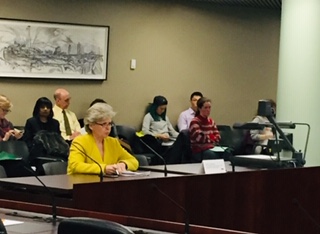The Provision of Housing as a Human Right
Speaking Notes for Colette Prevost, Director of Advocacy and Communications
February 07, 2019

Good morning:
My name is Colette Prevost, and I am the Director of Advocacy and Communications at YWCA Toronto, which is the city’s largest multi-service women’s organization. Our Association serves over 13,700 women and girls every year in more than 32 programs across the city.
YWCA Toronto has a long and proud history of partnership with the City of Toronto, particularly in providing housing for women and their families. We have operated gender-responsive programs for 146 years, and we are a subject matter expert on gender equity.
Our housing portfolio is rich and extensive. We work collaboratively with the city and all levels of government to provide 1,700 women and children with community and a place to call home. We are also pleased that in partnership with the City we opened a new homeless shelter for women in January.
However, a shelter bed is not a home. Across all of our programs at YWCA Toronto we have seen an increase in women living in extreme poverty, especially among single-mother-led families and senior women. This is consistent with reports that have named Toronto the income inequality capital of Canada and the child poverty capital of Canada – both pointing to growing gaps in opportunities and outcomes based on neighborhoods, gender, racial and ethnic lines.
The proposed blended property tax increase in the 2019 budget – which takes into account residential, multi-residential and non-residential increases – falls below inflation at just 1.8%. A rate this low does not even cover the rising costs of providing programs and services, much less provide resources urgently required to fund the several action plans and strategies City Council has adopted in recent years to improve the quality of life of residents and promote equity and inclusion in the city.
Without systemic investment in poverty reduction initiatives, inequality in our city will only grow, compromising the safety and prospects of marginalized women, girls and youth. 1,000 new shelter beds is a step in the right direction, as is the commitment to the new Housing Now program to increase permanent affordable housing.
But while Toronto’s Housing Now plan aims to build 10,000 new units only 3.3% will be deeply affordable housing. We must ensure a significant portion of our new affordable housing units are deeply affordable so that our most marginalized and vulnerable community members, many of whom are women who receive social assistance through Ontario Works or the Ontario Disability Support Program, can actually access these units.
The women we work with tell us that having access to safe, affordable housing at YWCA Toronto has transformed their lives and the lives of their children. We must ensure that no woman is ever forced to stay in a violent relationship because she cannot afford to leave or is forced to make the terrible choice between feeding her child or paying the rent. These are too frequently the lived experiences of many women in our city. Many families and single women stay in our shelters for too long because of the lack of affordable, permanent housing.
The provision of adequate housing is a fundamental human right. Although we appreciate the complexity of Toronto’s housing needs, bolder action is needed by Council to address the housing crisis. We agree with the Mayor that housing for women with mental health and addiction issues is very much needed and that other orders of government should contribute to supporting this pressing concern.
Similarly, the Youth Equity Strategy approved by Council in 2014 has yet to be fully funded. As the strategy points out, the city’s most vulnerable youth lack consistent and reliable access to safe spaces, programs that build positive socialization life skills, and equitable housing opportunities – all of which serve to further marginalize and endanger them. $2.6 million in new funding towards this strategy is a good step, but we must also ensure that funding is gender-responsive and takes into consideration the needs of girls impacted by violence in their communities.
At YWCA Toronto, we operate a Girls’ Centre in Scarborough. We have witnessed firsthand how a girls-only space creates safety for girls and results in positive outcomes for them in terms of mental health, well-being, confidence, and educational attainment.
No level of government has funded the work that we have done at the Girls’ Centre despite the fact that in 2007, our Safe Sisters program won the Mayor’s Community Safety Award. The financial responsibility of ensuring safe spaces for youth, and especially for girls, should not fall on the non-profit community alone. To that effect, we invite the City to work with us to ensure the sustainability and vibrancy of our girls’ programming.
In conclusion, this new Council has an opportunity to leverage the 2019 budget to have a meaningful and equitable impact. The stakes are incredibly high. We hope you will act with courage, determination, and partnership to create a livable and inclusive city for all.
Thank you.